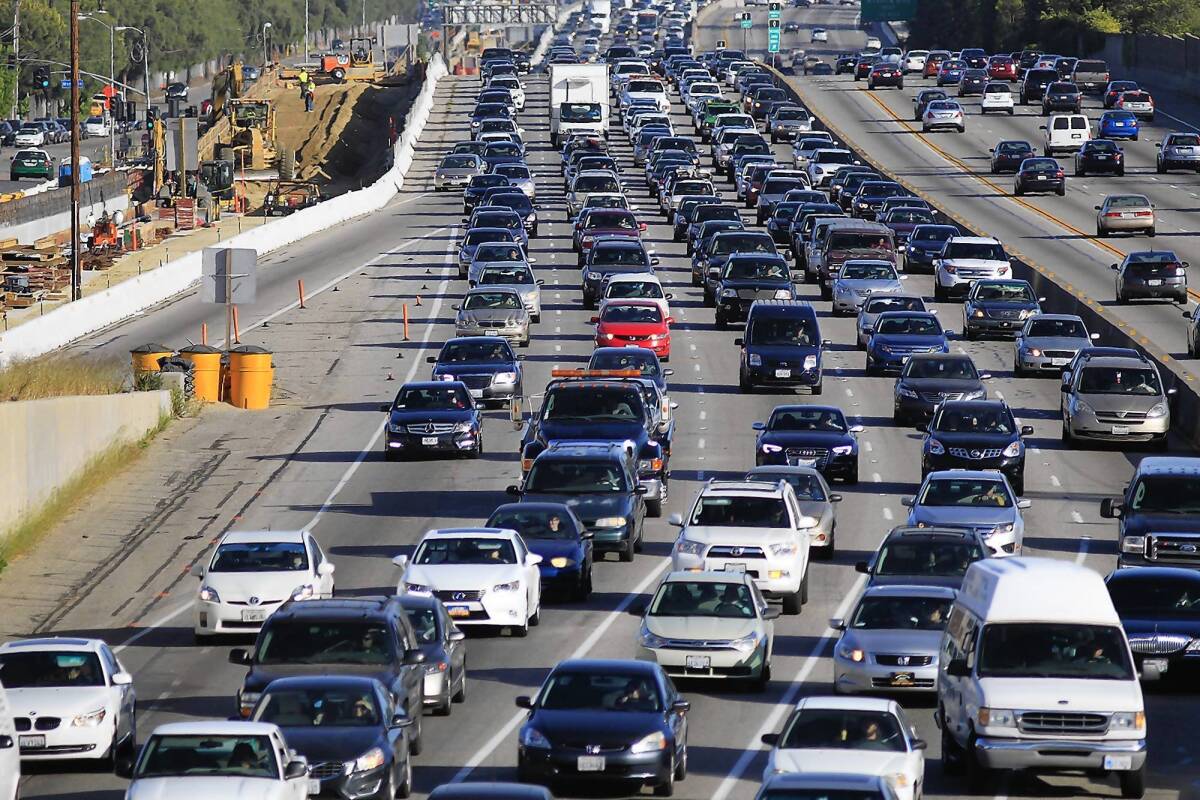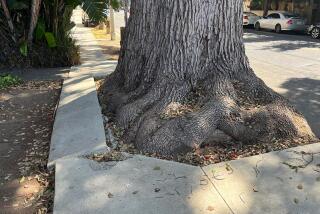405 project stuck in the slow lane

Elon Musk quips that it’s easier getting rockets into orbit than navigating his commute between home in Bel-Air and his Space Exploration Technologies factory in Hawthorne.
“The 405 … varies from bad to horrendous,” said Musk, who also co-founded PayPal and Tesla Motors. “It just seems people in Los Angeles are being tortured by this. … I don’t know why they aren’t marching in the streets.”
The massive project to widen the 405 Freeway is not only causing traffic nightmares for motorists like Musk but has also been plagued by cost overruns and delays.
Transportation officials say the project is now slated to take at least a year longer than first anticipated and cost about $100 million more than the originally budgeted $1 billion.
The companies handling the work won kudos when they were able to reopen the freeway ahead of schedule during the so-called Carmageddon events in 2011 and 2012. But that masked a larger problem for the main contractor, Kiewit, and the subcontractors.
Officials now aim to complete the bulk of the project by June 2014, with work on the problematic middle segment between Montana Avenue and Sunset Boulevard lasting perhaps until next fall, according to Michael Barbour, the veteran engineer overseeing the project for the L.A. County Metropolitan Transportation Authority. Kiewit has said “it could go as far as September,” Barbour said, “but we think we’re ahead of that.”
The delays and cost overruns are raising the ire of both residents and local officials, who say the project is causing major disruptions throughout the already traffic-clogged Westside.
“This project has been horribly managed,” said Zev Yaroslavsky, Los Angeles County supervisor and board member of Metro, which is running the project. “The performance of contractors has left a lot to be desired. … They’ve shown a complete lack of sensitivity and empathy for the community in which they’re doing the work.”
Asked why he and other elected officials have not publicly prodded the contractor to enlist more workers and equipment to speed the project, Yaroslavsky said: “Where’s the money going to come from? This project is over budget by a considerable amount, and Metro hasn’t figured out how it’s going to cover the cost overruns, let alone incur additional costs.”
Several factors have driven the delays, including the structural failure of miles of new sound walls that had to be demolished and rebuilt, a legal wrangle over the placement of ramps near the Getty Center and the complex logistics of finding and relocating more than a dozen utility lines under Sepulveda Boulevard.
All the while, Kiewit was instructed to keep traffic moving on one of the nation’s busiest highways.
Kiewit released a statement Wednesday defending its work.
“The costs and schedule impacts are the result of the project’s overall complexity and the significant challenges associated with multiple unexpected utility and right-of-way issues,” the firm said. “Kiewit and Metro are committed to working together to minimize future delays and resolve final costs. We ... are committed to delivering the highest-quality product on the I-405 project.”
Metro said some of the problems, such as the utility lines and legal issues over where ramps should be placed, were out of the contractor’s control.
The 405, which carries about 300,000 vehicles a day, is a vital north-south artery known for epic jam-ups under the best of circumstances.
In a bid to ease that notorious congestion, Metro and the California Department of Transportation four years ago began preliminary work on the final 10-mile leg of a carpool lane through the Sepulveda Pass. In addition to completing the northbound HOV link between Orange County and the San Fernando Valley, the project called for building new on- and off-ramps, demolishing and rebuilding three bridges and adding miles of retaining and sound walls.
At the time, officials forecast completion by spring 2013 — right about now. The timeline was later nudged to December 2013.
But after last fall’s Carmageddon II shutdown and countless other smaller and seemingly unpredictable closures, earthmovers, backhoes, K-rails and neon-vested workers are still much in evidence. Residents and businesses have met the further delays with moans, groans and a measure of resignation.
Nancy Z. Freedman, chairwoman of the Brentwood Community Council, read three chapters of “The Hare With Amber Eyes” while crawling two-thirds of a mile along viscous Sunset Boulevard from Kenter Avenue to Barrington Avenue. “The traffic did not move,” she said.
Sol Kahen, owner of Western Electric Supply near the Santa Monica Boulevard entrance to the 405, said road blocks and surly work crews have damaged his business. He has repeatedly called 405 project representatives to complain. “They don’t care,” he said. “Sometimes they let my customers go through the cones. Sometimes they were really mean.”
Kahen, 68, who lives in Woodland Hills, stays at work until 8 p.m. many nights to avoid the worst traffic through the Sepulveda Pass.
As for Musk, he leaves his SpaceX office near LAX 90 minutes before his five sons hit the sack at 8:30 p.m., but they’re usually asleep by the time he has slogged through the 405 construction zone and arrived home.
Fed up, he decided to throw money at the problem.
Last July, he met David Murphy, a Westwood resident, who heads Angelenos Against Gridlock, a group seeking to hasten the development and repair of infrastructure in California and nationwide. The two shared traffic frustrations, and Musk contributed $50,000 toward an effort to hurry the 405 project along. So far they have little to show for it.
In an interview, Musk said he’d be open to paying the costs of adding workers to the project “as a contribution to the city and my own happiness. If it can actually make a difference, I would gladly contribute funds and ideas. I’ve super had it.”
Metro’s Barbour emphasized the positives. The 405 project is two-thirds complete, he said. Wilshire Boulevard has new on- and off-ramps. A new, wider Sunset bridge is open, and drivers now have two lanes instead of one to merge onto the northbound 405 from the westbound 10 Freeway. The Skirball Cultural Center has a new on-ramp, and miles of sound walls and retaining walls have gone up. Metro will continue to open the project in phases so motorists can benefit from improvements when they are ready, he said.
Still, Yaroslavsky said he empathizes with affected motorists and residents.
“I totally understand the frustrations of people who live there and have to travel through there and get up in the middle of the night when jackhammers are going,” he said. “It’s just been a nightmare for everyone.”
As for who will bear fiscal responsibility for the cost overruns and delays, he said, “this is going to be fought out between the contractors and Metro for quite some time.”
More to Read
Sign up for Essential California
The most important California stories and recommendations in your inbox every morning.
You may occasionally receive promotional content from the Los Angeles Times.











